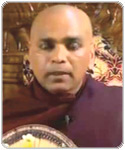|
Seeing the Buddha on this
Vesak day
 Ven. Dr. Mirisse DhammikaThera Ven. Dr. Mirisse DhammikaThera
2564 years have gone by since the Buddha passed away. Today, even though there
is no living Buddha, His Teachings, known as Buddhism are still alive. Thus, is
it possible to see the Buddha by learning and following His Teachings?
During Buddha’s time, a young man named Wakkali became a monk because he was
fascinated by the Buddha’s body. He was preoccupied by thoughts about Buddha’s
body rather than the teachings. When it was brought to his attention, the Buddha
said (yodhammangpassathi, so mangpassathi) “if one sees the dhamma, one sees the
Buddha“. Therefore, reflecting His supreme qualities and following the teachings
wisely are the noblest ways to respect and adore the Buddha. Anyone who begins
to explore Buddhism may also see this noble being, the Buddha by learning
analytically and following His teachings wisely.
Buddha’s teachings can be followed without any socioeconomic hindrance. The term
human is implied to all mankind. Any division may be based purely on their own
activity rather than by birth. According to Buddhism, a disciplined and its
actions shape an individual into a noble human being. This path of action can be
initiated through dana (generosity), sila (morality) and bhavana (meditation).
It should not be misunderstood that these activities can be performed only by
Buddhists. Without distinction, anyone who strives for physical and mental peace
can achieve these qualities.
Giving away acertain portion of what one has rightfully earned with purity in
mind and full of happiness is call generosity. One might think, “Why should one
give away any potion of what one has rightfully one”? When qualities like mutual
respect, trust, compassion, equanimity and patience develop among humans, the
relationship and the value of generosity become more obvious. There are four
things that are common to all beings, namely food, sleep, fear and reproduction
of the species, but human beings are distinct because of the ability of advanced
thinking. Buddhism sees this ability as the basis for generosity and morality.
However, one shall not become generous in anticipation of returns such as fame,
praise, leadership or any other gain. One has to develop generosity with a pure
mind.
Morality is the discipline of speech and body whereby one’s thoughts, words and
actions are harmless to one – self and to others. Can you imagine how much
relief it brings to all beings? There is no age difference in maintaining
morality that brings personal satisfaction and enhances the development of self
confidence.
Sila is two-fold in which engaging in daily activities in a righteous and a
civilized way is described as AbhisamacharikaSila and the non-civilized and
anti-social way of life that cannot maintain morality as Abhisamacharika Sila.
Meditation is training of the mind. In the Pali Cannon it reads “Bhavanathi
Vaddhana”. Mind wonders perpetually and entangles in intentions. The intentions
may be wholesome or unwholesome where wholesome intentions foster happiness and
the unwholesome ones destroy happiness. Therefore, focussing and keeping the
trained and disciplined mind on wholesome thoughts is the first step in
meditation which produces steady physical and mental happiness. By following
in-depth meditation, one is able to comprehend the true nature of life with all
its interactions. Then, one realizes that I, me and mine are nothings but
concept.
It is worthwhile to depict some examples of Buddhist Saints (Arahants) who
achieved permanent peace and happiness by following the Buddha’s teachings.
These are not super human, but noble qualities that can be developed by average
human beings. Stories such as Kisagothamie, Patachara, Punna and
Rajjumalamentioneded in the literature are known to many Buddhists. It is a joy
to reflect on how Buddha helped and relieved those human beings who were
engulfed in sorrow and helplessness. It should not be difficult to imagine the
state of mind of a woman who lost her husband, two children and her parents at
the same time. Patachara was one such woman. While people threw stones at her to
find relief by calling her “sister”. Those compassionate words brought relief to
her at a time when she was engulfed in unending sorrow. We often experience the
scenarios where individualsare made to suffer rather than helping them to find
relief, happiness and peace. There are numerous individuals with physical and
mental agony caused by social problems. Even though every one of them cannot be
helped economically, helping them with at least a kind word is a way of seeing
the Buddha.
Once the Brahmin Akkosabharadvaja invited the Buddha to his home. When Buddha
arrived, the Brahmin treated him with very harsh words. Imagine, how you would
react if you were confronted with a similer situation. Buddha listened to the
Brahmin and said, “Brahmin!, how would you treat your relatives and friends when
you invite them? Suppose if they refused to take what you offer, doesn’t that
remain wih you? Similarly, I do not accept your treatment and it is all yours”.
The Brahmin who was full of remorse and hatred was wise enough to understand the
message. He took refuge in the Buddha.
Isn’t the Buddha an example for those who think that it is impossible to live
the life without hitting back when hit or without verbally abusing when verbally
abused? Isn’t it a demonstration for problem solving using common sense and
kindness? Once, when Arahant Sariuth was walking for alms, a person who came
from behind beat him in the back. Arahant Sariuth kept walking in peace. The
abuser felt very embarrassed and begged for forgiveness. When asked why he
begged for forgiveness, the abuser explained what he did. Arahant Sariuthasked
him “did you beat me? Think for a moment why Arahant Sariuthmight have asked that
question. One may assume either he wasn’t aware of the beating or he simply
didn’t feel it. I would suggest the following. Perhaps his body was beaten, but
not the mind. Therefore, there was no anger and hatred. Often human being suffer
because they are mentally hurt rather than physically. If we look through a
coloured glass, the objects are seen coloured by the colour of the glass.
Similarly, if unwholesome thoughts are resident in the mind, one’s conscious
decisions and thoughts are affected by them. A pure mind full of wholesome
thoughts only can make decisions that foster harmony and happiness. The disciple
who treads the path of the Dhamma makes his way through the noble Eight Fold
Path which is the final segment towards enlightenment. Foe Bhikkus and laymen
alike there is no path other than the noble Eight Fold Path for enlightenment
(Nibbana).
Buddhism is not centered around a master but around virtues. We consider the
Buddha as our Teacher because of the supreme virtues and qualities incorporated
in Him. We pay homage not to his body but to his virtues. Therefore our teacher
is the noble qualities and supreme virtues. Where there are no virtues, there is
neither Buddhism nor Buddhists.
Generosity, non-greediness, compassion, kindness, simplicity, equanimity,
selflessness and patience etc., are a thousand and one qualities incorporated in
the Buddha’s teachings. It is worthwhile to think honestly for a moment and see
individually as to how many of these qualities are there in every one of us. It
is a way to see the Buddha and the Dhamma.
May you be well, happy and peaceful!!! |
